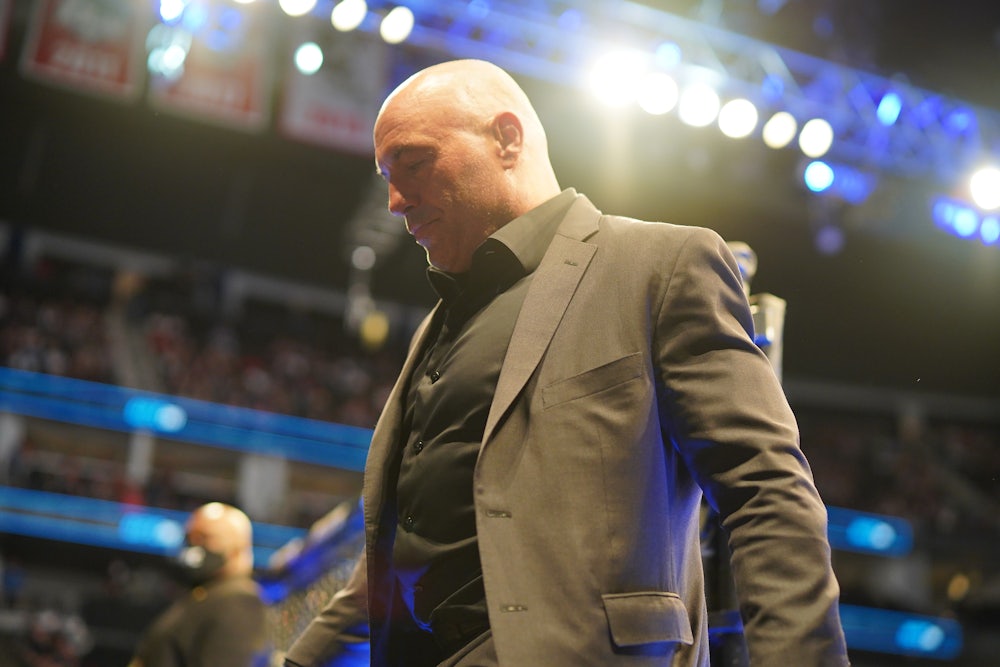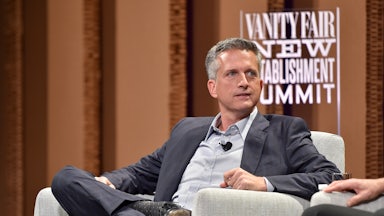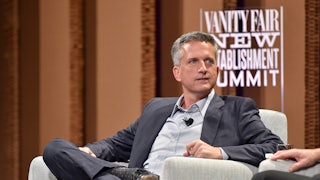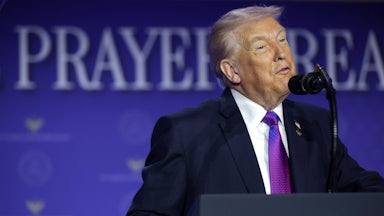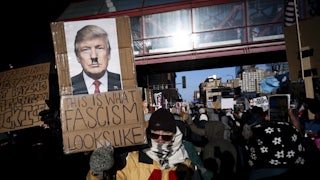In recent weeks, podcaster Joe Rogan’s commitment to disseminating vaccine misinformation has caused Spotify, the streaming service that exclusively hosts his wares, no end of self-torture. Rocker Neil Young, unwilling to continue being associated with the platform because of Rogan, took his leave; a number of other musicians followed suit. More recently, Spotify has deleted scores of old episodes of The Joe Rogan Experience in which the host used racial slurs (for which Rogan issued an apology). Last week, Spotify’s auto-da-fé even prompted a comment from the White House, as press secretary Jen Psaki urged streaming platforms to “do more” to combat the spread of pandemic misinformation.
The White House’s intrusion into the conversation isn’t a known best practice: Presidential administrations should avoid getting knit up in every daily tempest that emerges online. Psaki’s decision to weigh in only threw accelerant on the online flame war over free speech and censorship, with the government’s thumb now hovering over the scales of the First Amendment. But it also crowded out a better conversation about how l’affaire Rogan has illuminated the deeper problem with Spotify: how the platform earns its money. Musicians are getting exploited to feather wealthy podcasters’ nests.
In May 2020, Spotify—chasing the ever-elusive growth that investors prize as a metric—signed Rogan to an exclusive $100 million deal to be the sole provider of his podcast. The money didn’t exactly lift Rogan out of the middle class, it merely gilded what had already become a golden goose. Rogan wasn’t the only already wealthy content provider to score such a deal. A princely sum of $30 million was handed, appropriately I suppose, to Prince Harry and Meghan Markle. In recent days, the latter pair have raised concerns about Rogan’s content; Rogan might well express similar misgivings about the royals-in-exile’s work ethic: The fainéant Windsors have only produced 35 minutes of content, forcing Spotify to hire outside help to motivate them. (The Obamas also inked a soon-to-expire deal with the streaming service; they are reportedly looking for a new platform in the wake of these controversies.)
From whence did this money come? One needn’t hire a forensic accountant to figure it out: Spotify’s main business is music, specifically getting people to pay a subscription fee to license an enormous catalog of material dating back decades. Rogan’s big payday came on the backs of hundreds of less well-remunerated artists, whose own deals with Spotify now border on the punitive.
Musicians have taken the opportunity to change the discussion in recent weeks. One of the more outspoken has been Letters to Cleo frontwoman Kay Hanley, who co-founded Songwriters of North America to help musicians get a fair share of the streaming pie. Hanley expressed some ironic gratitude toward Rogan in the pages of Variety this week: “After years of suspecting that Spotify was becoming increasingly hostile to our interests but feeling powerless to do anything about it,” she wrote, “an opportunity we couldn’t have plotted or planned for just exploded into existence.”
Hanley describes Spotify’s history with recording artists as one that began with dizzy promises, sure to be delivered once the platform scaled up. “When they did in fact scale,” she says, Spotify “had a change of heart,” imposing “blatant pay-to-play-schemes involving artists forgoing royalties in exchange” for “algorithm boosts,” and fighting artists in court to keep their “scandalously low” royalty rates in place. (On Twitter, Hanley provided data showing that Spotify’s earnings-per-stream rate is the lowest in the industry; she also noted that many artists are trapped in contractual arrangements preventing them from seizing even these meager proceeds. Contract issues also prevent some artists from leaving Spotify even if they want to.)
It’s important not to be too Panglossian about the history of the music industry. As record producer Steve Albini famously documented for The Baffler, there is no golden, exploitation-free era to which recording artists might return. Still, it was only last October that the streaming services sought to impose what the National Music Publishers Association mocked as “the lowest royalty rates in history.” It’s clear that the “move fast and break stuff” ethos that guides so many Silicon Valley companies—to undermine labor rights, mostly—will inspire companies like Spotify to continue practices that serve their stable of artists poorly. And that’s regardless of whether Rogan remains on Spotify. Just this week, competing platform Rumble offered Rogan another hundred million dollars to jump ship. The good news is that, like Rogan, music fans have options, as well.
This article first appeared in Power Mad, a weekly TNR newsletter authored by deputy editor Jason Linkins. Sign up here.
